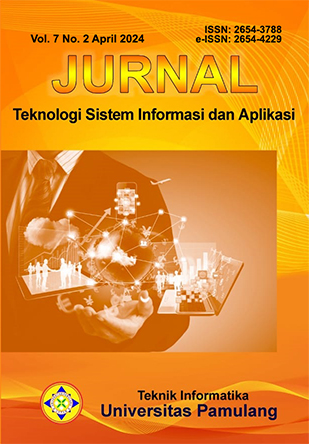Pengujian Blackbox pada Website Sistem Pemesanan Travel Online Gemilang Travel Berbasis Teknik Equivalence Partitions
DOI:
https://doi.org/10.32493/jtsi.v7i2.39049Keywords:
Blackbox Testing; Equivalence Partitions; Online Travel Booking System; Quality Assurance; Gemilang TravelAbstract
Online travel websites, such as Gemilang Travel, face complexities and dynamics that can result in potential errors and system failures. This can result in a bad experience for users and losses for the company. This research aims to identify potential errors that may occur in Gemilang Travel's Online Travel Booking System through Blackbox testing with the Equivalence Partitions technique. Blackbox testing is done without knowing the internal details of the system, so the focus is on the behavior of the system from the user's point of view. The Equivalence Partitions technique helps divide data input values into equivalent partitions based on expected system behavior. In this context, researchers used Blackbox testing with the Equivalence Partitions technique to identify potential errors. The testing methodology involved creating test cases, dividing Equivalence Partitions for each data input category, implementing the tests, and analyzing the test results. The test results show that based on 16 test scenarios that have fulfilled the designed scenarios and based on the calculation of equation 1 shows an EP test success percentage of 100%. This ticket booking application operates well and runs according to its function.
References
Hendri, H., Hasiholan Manurung, J. W., Ferian, R. A., Hanaatmoko, W. F., & Yulianti, Y. (2020). Pengujian Black Box pada Aplikasi Sistem Informasi Pengelolaan Masjid Menggunakan Teknik Equivalence Partitions. Jurnal Teknologi Sistem Informasi Dan Aplikasi, 3(2), 107-113. https://doi.org/10.32493/jtsi.v3i2.4694
Jat, S., & Sharma, P. (2017). Analysis of Different Software Testing Techniques. International Journal of Scientific Research in Computer Science and Engineering, 5(2), 77-80.
Kartiko, C. (2020). Black Box Testing Boundary Value Analysis Pada Aplikasi Submission SYSTEM. Edik Informatika, 6(2), 15-22. https://doi.org/10.22202/ei.2020.v6i2.3995
Ningrum, F. C., Suherman, D., Aryanti, S., Prasetya, H. A., & Saifudin, A. (2019). Pengujian Black Box pada Aplikasi Sistem Seleksi Sales Terbaik Menggunakan Teknik Equivalence Partitions. Jurnal Informatika Universitas Pamulang, 4(4), 125-130. https://doi.org/10.32493/informatika.v4i4.3782
Nugraha, B. F., Aditama, F., Arrofi, M., Ahmad, S. U., & Yulianti, Y. (2020). Pengujian Black Box pada Aplikasi Penghitungan Parkir Swalayan ADA Menggunakan Teknik Equivalence Partitions. Jurnal Informatika Universitas Pamulang, 5(2), 146. https://doi.org/10.32493/informatika.v5i2.5350
Nur, H., Nugroho, I. S., Saputra, M. R. E., Suhaemi, N., & Saifudin, A. (2020). Pengujian Black Box pada Aplikasi Sistem Pengarsipan Surat Menggunakan Teknik Equivalence Partitions. Jurnal Teknologi Sistem Informasi Dan Aplikasi, 3(2), 76. https://doi.org/10.32493/jtsi.v3i2.4692
Parlika, R., Nisaa’, T. A., Ningrum, S. M., & Haque, B. A. (2020). Studi Literatur Kekurangan Dan Kelebihan Pengujian Black Box. Teknomatika, 10(02), 131-140.
Prasetyo, H. D., Aminul Akbar, M., & Arwani, I. (2022). Pengembangan Sistem Pemesanan Paket Wisata berbasis Website menggunakan Midtrans Webservice sebagai Payment Gateway (Studi Kasus: Majapahit Tour & Travel). Jurnal Pengembangan Teknologi Informasi Dan Ilmu Komputer, 6(6), 2967-2973.
Ricat Sinulingga, A., Zuhri, M., Budi Mukti, R., & Saifudin, A. (2020). Jurnal Teknologi Sistem Informasi dan Aplikasi Pengujian Black Box pada Sistem Aplikasi Informasi Data Kinerja Menggunakan Teknik Equivalence Partitions. 3(1), 2654–4229. http://openjournal.unpam.ac.id/index.php/JTSI9
Saifudin, A., Fauzi, A., Prihantoro, B. A., Putra, D. E., & Ashiddiqia, R. (2023). Pengujian menggunakan Black Box dengan Teknik Equivalence Partitioning pada Sistem Penerbitan Buku, 1(1), 282-286 . https://journal.mediapublikasi.id/index.php/jriin
Sasongko, B. B., Malik, F., Ardiansyah, F., Rahmawati, A. F., Adhinata, F. D., & Rakhmadani, D. P. (2021). Pengujian Blackbox Menggunakan Teknik Equivalence Partitions pada Aplikasi Petgram Mobile. Journal ICTEE, 2(1), 10-16. https://doi.org/10.33365/jictee.v2i1.1012
Trengginaz, R. B., Yusup, A., Sunyoto, D. S., Jihad, M. R., & Yulianti, Y. (2020). Pengujian Aplikasi Pemesanan Tiket Kereta berbasis Website Menggunakan Metode Black Box dengan Teknik Equivalence Partitioning. Jurnal Teknologi Sistem Informasi Dan Aplikasi, 3(3), 144-149. https://doi.org/10.32493/jtsi.v3i3.5349
Zidan, M., Nur’aini, S., Wibowo, N. C. H., & Ulinuha, M. A. (2022). Black Box Testing pada Aplikasi Single Sign On (SSO) di Diskominfostandi Menggunakan Teknik Equivalence Partitions. Walisongo Journal of Information Technology, 4(2), 127–137. https://doi.org/10.21580/wjit.2022.4.2.12135
Downloads
Published
How to Cite
Issue
Section
License
Copyright (c) 2024 Alif Rizqi Apriliandra, Ilyas Nuryasin

This work is licensed under a Creative Commons Attribution-NonCommercial 4.0 International License.
Authors who publish with this journal agree to the following terms:
- Authors retain copyright and grant the journal right of first publication with the work simultaneously licensed under a Creative Commons Attribution License that allows others to share the work with an acknowledgement of the work's authorship and initial publication in this journal.
- Authors are able to enter into separate, additional contractual arrangements for the non-exclusive distribution of the journal's published version of the work (e.g., post it to an institutional repository or publish it in a book), with an acknowledgement of its initial publication in this journal.
- Authors are permitted and encouraged to post their work online (e.g., in institutional repositories or on their website) prior to and during the submission process, as it can lead to productive exchanges, as well as earlier and greater citation of published work (See The Effect of Open Access).
Jurnal Teknologi Sistem Informasi dan Aplikasi have CC BY-NC or an equivalent license as the optimal license for the publication, distribution, use, and reuse of scholarly work.
In developing strategy and setting priorities, Jurnal Teknologi Sistem Informasi dan Aplikasi recognize that free access is better than priced access, libre access is better than free access, and libre under CC BY-NC or the equivalent is better than libre under more restrictive open licenses. We should achieve what we can when we can. We should not delay achieving free in order to achieve libre, and we should not stop with free when we can achieve libre.
This work is licensed under a Creative Commons Attribution-NonCommercial 4.0 International (CC BY-NC 4.0) License
YOU ARE FREE TO:
- Share - copy and redistribute the material in any medium or format
- Adapt - remix, transform, and build upon the material for any purpose, even commercially.
- The licensor cannot revoke these freedoms as long as you follow the license terms



_2020_-_7(2)_2024_-_Thumbnail.png)












